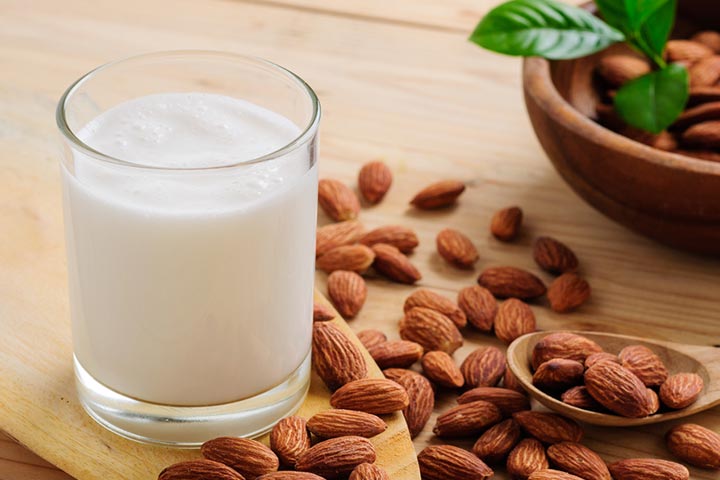Breastfeeding mothers need to be careful about what they eat and drink since it could affect the baby through breast milk. Some babies may even acquire a taste of what they eat through breast milk. Milk is a common beverage you may consume but is it safe to consume almond milk while breastfeeding?
In general, drinking almond milk offers numerous health benefits as it is high in essential nutrients. It is a vegan, plant-based option for mothers seeking a non-dairy, lactose-free milk substitute. Continue reading to learn if you can drink almond milk when nursing your baby, as well as its nutritional content and health advantages.
What Is Almond Milk?
Almond milk serves as an alternative to dairy milk. It is a plant-based nut milk obtained by grinding the toasted raw almonds with water. Almond milk is a nutritious and natural drink that contains no added colors or flavors (1).
Nutritional Value Of Almond Milk
Almond milk offers many nutritional benefits. Compared to normal cow’s milk, almond milk is low in both fats and calories. A single cup of sweetened almond milk contains approximately 90 calories and 2.5 grams of fat. On the other hand, a cup of cow’s milk contains 120 calories and 5 grams of fat. Almond milk can also serve as a low-calorie natural drink if you avoid adding artificial flavors and sweeteners to it. A cup of plain almond milk contains 30 calories only!
Additionally, as the almond milk is not an animal-based product, it does not contain cholesterol or harmful saturated fats. However, it only provides 1 gram of protein per cup, whereas a single cup of cow’s milk supplies 8 grams of protein.
Individuals who have lactose intolerance or a milk allergy can safely consume almond milk without worrying about experiencing any digestion problems.
Almond milk is low in fats and rich in vitamin E, vitamin D, Vitamin A, and calcium. It also contains trace amounts of sodium, iron, magnesium, phosphorus, and dietary fiber. All these elements can ensure proper infant nutrition and healthy development of your breastfeeding baby.
Health Benefits Of Almond Milk While Breastfeeding
Here are some of the ways in which drinking almond milk while breastfeeding can work wonders for your health:
- Enhances Breast Milk Production: The considerable amount of omega-3 fatty acids in almonds may stimulate your hormones, although scientifically not proven to enhance your breast milk quantity and quality. If you are suffering from a poor lactation level, drinking almond milk regularly can have psychological effects only in enhancing breast milk.
- Boosts Your Immunity: The delicious alternative to cow’s milk is a storehouse of vitamins and minerals. Regular intake of it can improve the functioning of your immune system and keep dreadful diseases and infections at bay. It can boost your pace of recovery post childbirth and safeguard the health of your little one.
- Protects Bone Health:The calcium and phosphorus content of almond milk helps to ensure better infant development by promoting stronger and healthier bone development in your growing baby. You may increase your calcium intake by adding supplements to your diet with your doctor’s advice.
- Improves Eye And Skin Health: As a new mother juggling maternal chores taking out time for grooming must be a mission impossible for you! Fret not! Do you know a glass of almond milk not only guarantees good health but also ensures that compliments keep coming your way! Almond milk is a rich source of Vitamin A that helps fight oxidative stress, eliminate free radicals, prevent aging and protect against macular degeneration. The Vitamin E in it can give you a glowing skin and a lustrous mane without any effort!
How To Prepare Homemade Almond Milk?
Here is a simple method to enjoy the goodness of homemade almond milk:
You Will Need:
- 1 cup of raw almonds
- 3 cups of water
- 3 Pitted dates
- A pinch of salt
How To:
- Soak the raw almonds in water overnight.
- Drain the excess water and rinse the nuts thoroughly.
- Add ingredients in a blender.
- Churn to obtain a smooth watery consistency.
- Filter the frothy mixture using a strainer.
- Your homemade almond milk is ready to serve.
- You can store the almond milk in your refrigerator for up to three days.
Is Almond Milk Safe While Breastfeeding?
Remember, as a breastfeeding mother, your diet will have a direct impact on your baby’s health too.
Therefore, it is advisable that you seek a nod of approval from your doctor before adding almond milk to your breastfeeding diet or completely replacing cow’s milk with it. Remember to consume it in moderate quantities only as anything in excess during this delicate phase may spell danger for you or your baby.
Taking care of the maternal diet while breastfeeding is as important as it was during pregnancy. What you eat or drink will directly or indirectly reach your baby—consuming almond milk while breastfeeding ensures that the proper nutrients will reach your baby. It will also keep your weight in check due to its low calorie and fat content. Besides, it does not contain cholesterol or harmful saturated fats. However, seek your doctor’s advice before adding almond milk to your postnatal diet. If you have any dietary restrictions, such as nut allergies or intolerance, mention them to your doctor. Remember, you should take it in moderate quantities as you would not want to harm your baby
Key Pointers
- Almond milk is a substitute for cow milk high in vitamins (D and E), minerals, calcium, and low in fat and cholesterol-free.
- Almond milk is recommended for lactating women as it can increase breast milk production, strengthen the immune system, and improve eye and skin health.
- Women who have nut allergies should avoid the consumption of almond milk during breastfeeding.
- A doctor’s consultation is advisable before consuming almond milk while nursing.
Almond milk is a popular alternative to dairy milk but has its pros and cons. Learn more about them in this video!













